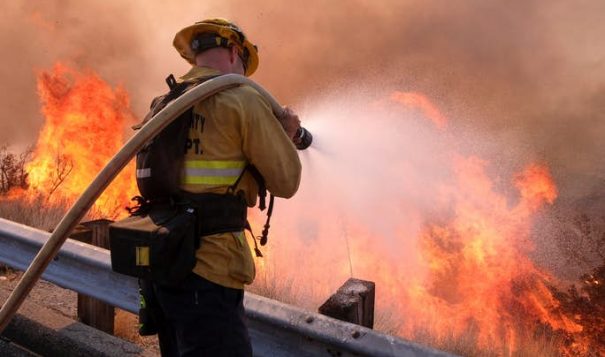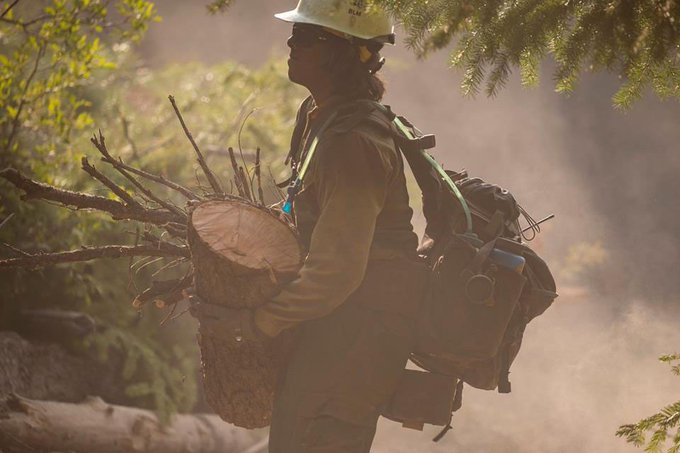Lakeview Crew 7 earns Hotshot status, the first interagency hotshot crew in the country comprised almost entirely of U.S. military veterans. Kari Greer photo. https://wildfiretoday.com/2018/11/14/lakeview-crew-7-earns-hotshot-status/ …
‘Devastated’ Lytton Tribe donates $1 million to victims of deadly CA wildfire
 A firefighter battles a fire along the Ronald Reagan (118) Freeway in Simi Valley, Calif., Monday, Nov. 12, 2018. (AP Photo/Ringo H.W. Chiu).
A firefighter battles a fire along the Ronald Reagan (118) Freeway in Simi Valley, Calif., Monday, Nov. 12, 2018. (AP Photo/Ringo H.W. Chiu).
California’s current spate of destructive wildfires hasn’t driven any tribal peoples from their homes, but the Camp Fire in northern California’s Butte County, named after its origin of Camp Creek, is now the deadliest and most destructive wildfire in California history. In fact, it is the worst wildfire in American history and has obliterated Paradise, a town of 27,000.
The fire started in the early morning hours of November 8 and swept into the town so fast residents had little time to evacuate, if they were notified at all. Traffic gridlock swiftly ensued. Tires melted. Some people jumped from their cars and ran for their lives. A reported few survived by submerging their bodies in areas of water.
As of this writing, the fire has caused 63 fatalities, left 631 people unaccounted for, destroyed nearly 12,000 structures, and covered an area of about 140,000 acres. It forced the evacuation of six towns and threatened more communities than that. As of November 15, the fire was 40 percent contained, and still threatened 15,000 structures.
With so much damage and threat to human welfare, “The destruction and loss of life and property in Butte County has devastated the Lytton Rancheria Band of Pomo Indians,” Lytton Tribal Chairperson Margie Mejia said in a statement. The Rancheria, owner of the San Pablo Lytton Casino in an area near San Francisco not affected by wildfires is donating one million dollars to the Camp Fire Fund 2018 that the regional Tri Counties Bank opened with $25,000.
“It is the Lytton Rancheria’s deepest hope that our donation will help to support the victims of this tragedy as they begin to recover and rebuild their lives,” Mejia said in a statement. “We are hopeful this donation will inspire other companies and individuals to contribute anything that they can to assist the Camp Fire Fund, as all donations will be used to directly aid the victims and their families.”
“I am grateful and moved by the generosity of the Lytton Band of Pomo Indians,” Butte County Supervisor and Paradise resident Doug Teeter said in the statement.
“While people have lost their homes and possessions and are now sleeping in parking lots and shelters, kindness like this helps lift the spirits of our citizens and provides immediate relief,” he said. “We hope others will see the generous example set by the Lytton Band of Pomo Indians and assist our community financially in any way they can. With this support for our community, we will rebuild above the ashes.”
Wildfire Strike Teams and Hotshots Called in from Western States
To date, the Camp Fire has injured three of the nearly 5,600 firefighters that have come in from all over California as well as Oregon, Washington, Idaho, Montana, Utah, and Texas. The wildfire strike teams are employing 622 engines, 75 water tenders, 103 bulldozers, and 24 helicopters.
Firefighters from the U.S. Forest Service Interagency Hot Shot Group – most people just call them Hotshots – were immediately deployed to the Camp Fire and sent to the most tactical locations, working alongside smoke jumpers, where their skills and adroit maneuvering are required.
Hotshots have specialized training, and usually work with tools to stop the fire, rather than water. They remain in the fire zone for days, and they can work 48 hours straight without sleep (although so can their wildfire firefighter counterparts).
After President Trump blamed California’s wildfires on poor forest management and threatened to withhold aid to its victims in a tweet November 10, Brian K. Rice, president of the California Professional Firefighters union responded with condemnation.

“The president’s message attacking California and threatening to withhold aid to the victims of the cataclysmic fires is ill-informed, ill-timed and demeaning to those who are suffering as well as the men and women on the front lines,” Rice said in a statement.
“At a time when our every effort should be focused on vanquishing the destructive fires and helping the victims, the president has chosen instead to issue an uninformed political threat aimed squarely at the innocent victims of these cataclysmic fires.”
“At this moment, thousands of our brother and sister firefighters are putting their lives on the line to protect the lives and property of thousands. Some of them are doing so even as their own homes lay in ruins. In my view, this shameful attack on California is an attack on all our courageous men and women on the front lines.”
President Trump now plans to visit victims of the wildfires in California on Saturday, November 17. The White House has not released his exact schedule.
A low intensity 30-acre wildfire on the Hoopa Valley Indian Reservation in northern California and Six Rivers National Forest is 15 percent contained and is being fought by firefighters from both the Tribe and the National Forest working together in a unified command.
A fire in southern California that started the same day as the Camp Fire has killed three. It is expected to be contained by November 18.
Northern California has the worst air quality in the world right now. Smoke from wildfires is a mix of gases and fine particles that can hurt your eyes, irritate your respiratory system, and worsen chronic heart and lung diseases. The Indian Health Service has issued guidance on the poor air quality due to the smoke from the Camp Fire in Butte County.
To learn more about the Hotshots watch Meet the Hotshots on YouTube, Episode 4 of ABC10’s California Wildfires: The New Normal.
Our goal is to help our community stay informed. The Buffalo's Fire Newsletter is published at 12 p.m. CST every Wednesday. Our digital news site is published by the Indigenous Media Freedom Alliance, a Native-led, Native-woman founded nonprofit media organization based in Bismarck, N.D. We can be reached at 701-301-1296.
By submitting this form, you are consenting to receive marketing emails from: . You can revoke your consent to receive emails at any time by using the SafeUnsubscribe® link, found at the bottom of every email. Emails are serviced by Constant Contact
Jodi Rave Spotted Bear
Jodi Rave Spotted Bear is the founder and director of the Indigenous Media Freedom Alliance, a 501-C-3 nonprofit organization with offices in Bismarck, N.D. and the Fort Berthold Reservation. Jodi spent 15 years reporting for the mainstream press. She's been awarded prestigious Nieman and John S. Knight journalism fellowships at Harvard and Stanford, respectively. She also an MIT Knight Science Journalism Project fellow. Her writing is featured in "The Authentic Voice: The Best Reporting on Race and Ethnicity," published by Columbia University Press. Jodi currently serves as a Society of Professional Journalists at-large board member, an SPJ Foundation board member, and she chairs the SPJ Freedom of Information Committee. Jodi has won top journalism awards from mainstream and Native press organizations. She earned her journalism degree from the University of Colorado at Boulder.



